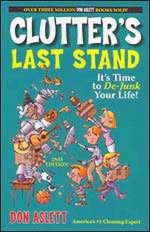Clutter’s Last Stand: The Cost of Buying Things You Will Not Use
During the 1990s, I used credit cards to fund my every whim. I bought books and games and computers and gadgets. Now, ten years later, I'm still carrying a lot of that debt in the form of a home equity loan (into which  I rolled all my credit cards several years ago). I also still have a lot of the crap I bought.
I rolled all my credit cards several years ago). I also still have a lot of the crap I bought.
I have a plan for getting rid of the debt by next spring, but until recently I had no intention of getting rid of the things I had bought with the money. Instead, I let them take up space in the garage, in the workshop, in the basement. Physical reminders of my foolish purchases were all around me. The clutter was as much a mental burden as the debt!
Then a reader recommended Clutter's Last Stand: It's Time to De-Junk Your Life. Author Don Aslett is a cleaning zealot — reading this book opened my eyes. In a chapter called “The Economy of Clutter”, Aslett lists the costs of clutter:
- Clutter makes every job take longer
- Clutter makes cleaning take longer
- The value is in the using, not the owning
- Storing clutter costs you
- Guarding clutter costs you
- Moving clutter costs you
- Even owning clutter costs you
“No matter how you look at it,” writes Aslett, “clutter is a poor investment.”
Kris and I spent Saturday sorting through my poor investment. Our community garage sale is this weekend, so this seemed like a good time to get rid of some of the junk that has been cluttering up our lives. It took a l-o-n-g time. We have way too much stuff.
We sorted through dozens of boxes, purging junk. We saved the best items to sell,  but many things went directly into the trash. Every time I pitched something, I winced. These things are physical representations of my debt. I felt like I was literally throwing my money away. It especially hurt because I'm still paying interest on this stuff!
but many things went directly into the trash. Every time I pitched something, I winced. These things are physical representations of my debt. I felt like I was literally throwing my money away. It especially hurt because I'm still paying interest on this stuff!
When I tossed my electronic chess game (missing two rooks and the instructions), I recalled buying it for $79 at Radio Shack in 1995. I spent over $500 on computer programming manuals around the same time, manuals that haven't been opened since I bought them. This morning they're sitting at the curb in the recycling bin. I couldn't bring myself to throw away the box full of computer games I acquired (but hardly played) over the past fifteen years, but as I write this entry, I know that when I get home today they're all going in the trash. Is there really any reason to hold onto a copy of Duke Nukem?
I've written before that you should not buy things you cannot afford. Here's another tip: Don't buy things for which you have no use. Don't buy things you do not need or want. This is common sense, I know. But for a decade, I bought anything that sounded bright, shiny, and new. I'm not the only one. Aslett writes:
There are people who all their lives dream […] whatever they want above all, and as their live nears its end, they finally accumulate the cash to have the big dream come true. Even if they can't use it much, they go buy it — thinking that the having is the ultimate. But it all comes to little because they can't smell and feel and share the glory of daily use. The value is in the using and building and growing, not simply the having.
The value is in the using, not in the having. It has taken me 38 years to realize this!
Fortunately, I'm not the same person I was five or ten years ago. I still buy dumb things now-and-then, but mostly I've learned to control myself. I bring less junk into my life. What has changed?
- I've learned to ask myself, “Will I use this?” If I'm at a bookstore and feel the urge to buy something I ask myself, “Will I read this?” It's shocking how often the answer is “no”. When it is, I put the book back on the shelf.
- I used to buy things on impulse, not because I wanted them. I simply had the urge to spend. Now if I really want something, I generally force myself to wait using the 30-day rule.
- I've also begun to purchase quality items. So much of what we threw away Saturday was cheap and shoddy. It's worthless. Now, for example, if I decide I want a messenger bag, I save until I can afford one that is high quality. By taking the time to save, I often decide I don't want the thing after all.
Though it hurts to think of how much money I threw away over the weekend, it's a relief to get rid of this junk. The debt I incurred to buy it is a mental burden, but so was having this stuff in the garage. It feels great to be clearing out this space. It'll feel even better next spring when I've finally paid off my home equity loan!
Become A Money Boss And Join 15,000 Others
Subscribe to the GRS Insider (FREE) and we’ll give you a copy of the Money Boss Manifesto (also FREE)
